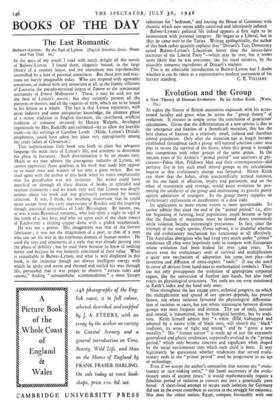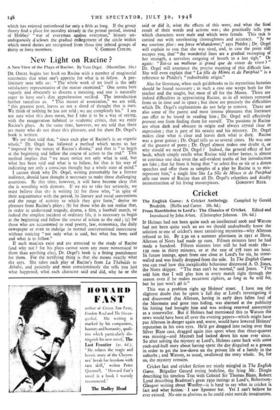Evolution and the Group
AT eighty the Nestor of British anatomists expounds with his accus- tomed lucidity and grace what he terms the " group theory " of evolution. It restates in simple terms the conclusion of geneticists' calculations. Given that the differentiation of a new species is due to the emergence and fixation of a (beneficial) mutation, this has the best chance of fixation in a relatively small, isolated and therefore inbred population. Only after the mutation has at length become established throughout such a group will natural selection come into play to secure the survival of the fittest, when this group is brought into competition with other groups of the same genus. In the soo,000 years of Sir Arthur's " primal period " our ancestors or pre- cursors—Pekin Man, Piltdown Man and their contemporaries—did perforce live in just such small inbred groups as the calculations require so that evolutionary change was favoured. Hence Keith can show that the habits, often unscientifically termed instincts, on the one hand of affection, loyalty and patriotism, and on the other of resentment and revenge, would assist evolution by pro- moting the solidarity of the group and maintaining its genetic purity against admixture of strangers. So the group theory supplies an evolutionary explanation or justification of a dual code.
Its application to more recent events is more questionable. Its author admits that since the end of the " primal period," i.e., after the beginning of farming, local populations could become so large that the fixation of mutations must be slowed down enormously while isolation became increasingly precarious. In fact, since the triumph of the single species, Homo sapiens, it is doubtful whether the old evolutionary mechanism has functioned at all effectively. The Australian aborigines who had lived very much under " primal " conditions till 1800 were hopelessly unfit to compete with Europeans whose evolution had been braked for over 5,000 years. To secure even the evolutionary ends of survival and multiplication a quite new mechanism of adaptation has come into play—the invention and diffusion of extra-organic " tools." (I use the word to cover all devices from hand-axes to mathematical symbols.) Their use not only presupposes the evolution of appropriate corporeal organs, like the conversion of forefeet into hands, but also itself reacts on physiological structures. Yet tools are not even mentioned in Keith's index and the hand only once.
Now throughout the last mono years, technical progress, on which the multiplication and spread of our species depends, has proved fastest, not where isolation favoured the physiological differentia- tion of varieties or races, but just where intercourse between diverse groups was most frequent and intense. The use of tools, manual and mental, is transmitted, not by biological heredity, but by tradi- tion. Keith himself admits that " a white child, kidnapped and adopted by a native tribe of black men, will absorb the ' black' tradition, its sense of right and wrong " and be " given a new morality." His " human nature " is made up of just the extremely generalised and plastic tendencies, supposedly evolved in the "primal period," which only become concrete and significant when shaped by the social environment into which each child is born. It may legitimately be questioned whether tendencies that served evolu- tionary ends in the " primal period " need be progressive in an age of technology.
Even if we accept the author's contention that nations are "evolu- tionary or race-making units," " the lineal successors of the evolu- tionary units of ancient times," it would mathematically require a fabulous period of isolation to convert one into a genetically pure breed. A short-lived attempt to secure such isolation for Germany did not in the event contribute to success in the struggle for existence. Nor does the oldest nation, Egypt, compare favourably with one
which has enjoyed nationhood for only a fifth as long. If the group theory find a place for morality already in the primal period, instead of Hobbes' " war of everyman apiAst everyman," history un- ambiguously discloses the gradual enargement of the circle within which moral duties are recognised from those tiny inbred groups of



































 Previous page
Previous page